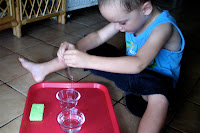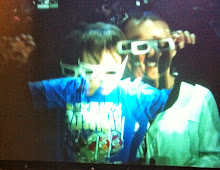
TODAY'S ACTIVITIES:My son and I had a playdate this morning instead of school. Sometimes you have to be flexible, especially when you (and your kid, of course) haven't seen a particular friend in a while due to scheduling conflicts. We'll take a stab at doing some school this afternoon, post-nap. I'm not sure how successful this will prove, but it's worth a try.
So I'm halfway through Alfie Kohn's Unconditional Parenting, and so far I've found it life-changing. Pretty dramatic description, I know, but true nonetheless. I'm not a big parenting book reader; I tend to rely more on instinct and reflection than advice from "experts." I have friends who are always talking to me (sometimes at me) about the latest and greatest book on disciplining your kid or sleep-training your kid or understanding your kid or training your kid to jump through hoops, and I've even gone so far as to purchase a few of these "You have to read this!" parenting books. The thing is, though, that despite my best intentions, I never really read them. I begin reading them, of course, but invariably find the writing too prescriptive--do this, don't do that. I live in the realm of "shoulds" enough as it is; I'm always telling myself I should eat this and I shouldn't eat that and I should get more exercise and I shouldn't yell at the cat and I should be more patient and I should call my grandmother and I shouldn't watch anymore Real Housewives on TV. I don't need a parenting book telling me what I should do every time my kid loses his temper and shouts at me or my husband. The author doesn't know me or my kid or what led up to the shouting incident in question; how can he or she say for sure how I should respond? Kohn offers a more descriptive technique, discussing in detail the predominant approach to parenting and questioning not only its effectiveness but its long-term effect on our kids. I've got to tell you, even if he didn't cite a ton of studies that back up what he says, I'd agree with Kohn just based upon his use of logic.
Kohn begins the book asking you to describe what type of person you'd like your child to be as an adult. Almost all of us would use the same descriptors: happy, fulfilled, responsible, confident, thoughtful, independent, kind. Then he says to ask yourself, "Are my everyday practices likely to help my child grow into the kind of person I'd like him to be?" When interacting with our kids--especially when they're small--the majority of us focus almost entirely on their behavior. It's all about what they're eating, how much they're sleeping, to what degree they know their colors and numbers and ABCs, whether they're playing nicely with their friends, whether they've picked up their toys, whether they're getting in our way as we try to accomplish things throughout the day. And when we deem their behavior inappropriate or, even worse, bad, we create consequences: we give our kids time-outs or shout at them or withdraw our love and affection for a while. In short, we make our kids feel bad--we punish them--in order to try to control their behavior, usually without ever considering the causes of our kids' inappropriate actions. Kohn's argument is that all this attention we place on our kids' behavior and all the energy we expend trying to control our kids' behavior does not in any way conform to what we assert to be our long-term goals as parents. Do we want them to learn to mindlessly obey authority figures, to only do things (or not do things) out of a fear of punishment? Do we want to teach them that their motives and emotions don't matter, that The Rules must be obeyed... or else? Regardless, Kohn cites a ton of research that shows that punishment doesn't work in the long run. Not only that, rewards (what people sometimes call "positive reinforcement") don't work either. (And remember, praise is just a form of reward!) Look at it this way: most parents have come to accept that the "you must clean your plate" approach to mealtimes is outdated and harmful. Kids need to learn to listen to their bodies, to regulate their own appetites by means of natural feelings of hunger and satiation. Children whose parents control their eating often end up with weight problems and/or eating disorders. Well, the same applies to kids' behavior: if we become dictators, constantly controlling our kids' actions via threats of punishment and/or promises of reward, they never learn to regulate themselves, they never develop their own sense of motivation, of morals, of responsibility. Even worse, independence and initiative is, in a word, stifled.
There's more to this, obviously. I can't sum up everything Kohn says. The one caveat to it all is that you've got to believe your kid is basically good-natured--that kids wouldn't always act badly if they thought they could away with it, that there's almost always a rational explanation for why your kid misbehaved. Maybe they were uncomfortable--physically or psychologically, maybe they were tired or hungry, maybe we were expecting too much from them, given their age. When you enter the kitchen and see a tub of yogurt spilled all over the floor, of course you're going to get upset. But why take it out on your child? He was most likely hungry and trying to get himself something to eat; maybe you were unavailable--in the shower or on the phone--so he thought he'd help himself, instead of interrupting you. Kids' motives are almost always innocuous. I get frustrated when Parker occasionally refuses to pick up his toys; I finally stopped to think about those times he does refuse and it's always when the mess is a big one, with lots of bits and pieces (like LEGOs or Matchbox cars spilled all over, everywhere). It dawned on me that he feels overwhelmed when the mess appears massive. Why wouldn't he? Usually, if I offer to help clean up, he gets moving and the toys are put away in a flash. If I stand there, unyielding, nothing productive occurs, and bad feelings on both our parts become inevitable. The important thing is to never give your child reason to doubt your love. "How we feel about our kids isn't as important as how they experience those feelings and how they regard the way we treat them." Is getting your kid to do exactly as he's told really worth sacrificing his apprehension of your love? If you really do love him unconditionally--even when he has a tantrum or makes a mess or won't let you brush his teeth--then treat him that way.
The second half of the book suggests ways you can guide (not control!) your child's actions--because of course there are times you need to--without using punishments or rewards, without sending the message that your love is conditional upon good behavior. Should be interesting...
Postscript: Kohn also addresses motivation; how we use/abuse rewards (including praise!) in our attempts to encourage our children to "succeed." Basically, the same holds true: by doing so, we're stifling our kids' abilities to motivate themselves and making them feel as though our love is conditional upon them doing well. Extrinsic motivation imposes our own ambitions upon our kids and stifles their instinctual sense of initiative.



































